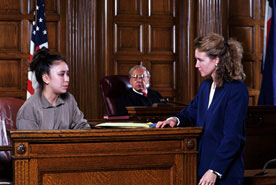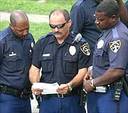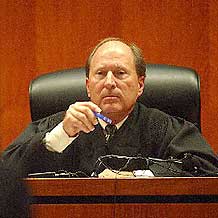حقوق متهم
The Rights of the Accused
In English-speaking countries, the rights of an accused person are taken very seriously. Over many centuries, laws evolved in such a way that people could not be arrested or chargedwithout a very good reason.
Of course, every country needs to enforce its laws. This means that police officers are needed, and so are “prosecutors”-the lawyers whose job is to make criminal charges against people who break the laws, and to prove that those charges are true. However, it is very important that people’s freedoms are not taken away wrongly. People should not be punished unfairly, and people who are accused of crimes must have the opportunity to defend themselves.
In some parts of the world, people can be arrested and imprisoned for long periods of time, without any criminal charges being made against them. One of the most important principles of justice in English-speaking countries is that a person cannot be held by the police unless that person is charged with a crime. This principle is known by the Latin term, “habeas corpus.” According to the idea of habeas corpus, the police are not allowed to detain a person for more than a certain period of time (usually, twenty-four hours), unless some charge is made against the person. A judge will order the release of a person who is not charged with a crime.
Another important feature of justice systems in most English-speaking countries is that accused individuals have the right to be represented by a lawyer. Most accused people want to hire an expert lawyer. However, even if a person cannot afford to hire a lawyer, the criminal court must provide a lawyer who will represent that person. The lawyer for an accused person is required to defend that person as thoroughly as possible.
One of the most important aspects of justice systems in the United States and the British Commonwealth is that an accused person must be fully informed of any charges made against them. Also, any evidence that will be used to show the accused person’s guilt must be shared with the accused person and with that person’s lawyer. In this way, accused persons can challenge the truth of any evidence that will be used against them. Similarly, any person who acts as a witness against an accused person can be cross-examined by the accused person’s lawyer. This means that the statements of a witness can be challenged by the accused person.
Another important element of most English-speaking justice systems is that evidence must be obtained fairly. Police officers cannot simply enter a person’s home to look for evidence of a crime. They must first have a good reason to believe that a crime has been committed, and they must obtain permission from a judge to enter the person’s property. This permission is called a “search warrant.” Because search warrants are required, people are free from arbitrary invasions of their property by the police.
Finally, another important aspect of most English-speaking justice systems is that trials must be held in public, where other citizens can watch the trial. An accused person is not tried secretly. Moreover, as discussed in another passage, the accused person has the right to be tried by a jury of other free citizens. All of these rules ensure that order can be maintained without taking away the freedom of innocent people.
evolve:
to develop and change gradually over a long period of time
The school has evolved its own style of teaching.
Businesses need to evolve rapidly.
evolve out of
The idea evolved out of work done by British scientists.
evolve into
The group gradually evolved into a political party.
Some people believe that we evolved from the apes.
The women’s movement has evolved over several decades.
They evolved a new system for running the factory.
Language is constantly evolving.
folk music that evolved out of popular culture
charge:
▶CRIME◀
[transitive] to state officially that someone may be guilty of a crime
charge somebody with something
Gibbons has been charged with murder.
enforce:
to cause (a rule or law) to be obeyed or carried out effectively:
Governments make laws and the police enforce them.
prosecutor:
Someone (often a lawyer )
who is trying to prove in a court of law that someone is guilty of a crime
charge:
▶CRIME◀
[countable] an official statement made by the police saying that they believe someone may be guilty of a crime
charge against
He was found guilty of all six charges against him.
Phillips was arrested on drug charges.
The following morning, he was arrested on a charge of burglary.
Young appeared in court on a murder charge .
charge of
Higgins is facing a charge of armed robbery.
As it was his first offence, the store agreed not to press charges .
Police dropped the charges against him because of insufficient evidence.
Nine people have pleaded guilty to various charges .
Green was cleared of all charges against him.
defend:
to be a lawyer for someone who has been charged with a crime
ᅳsee also prosecute
He had top lawyers to defend him.
Howard, defending, said Thompson had been drinking heavily.
habeas corpus:
a law which says that a person can only be kept in prison following a court’s decision
detain:
to prevent (a person) from leaving for a certain time:
Two suspects have been detained by the police for questioning .
She was detained in hospital with a suspected broken leg.
The police have detained two men for questioning at the police station.
individual
represent:
▶IN COURT◀
[transitive] to speak officially for someone in a court of law
represent yourself
She decided to represent herself (=speak for herself without a lawyer) during the trial.
thoroughly:
1
completely
She sat feeling thoroughly miserable. thoroughly cooked meat
2
carefully, so that nothing is forgotten
The room had been thoroughly cleaned.
warrant:
a legal document that is signed by a judge, allowing the police to take a particular action
warrant for
The magistrate issued a warrant for his arrest.
ᅳsee also death warrant, search warrant
search warrant:
a legal document that gives the police official permission to search a building
arbitrary:
1 typical of power that is uncontrolled and used without considering the wishes of others:
arbitrary arrests/punishments
an arbitrary ruler
2 decided by or based on chance or personal opinion rather than facts or reason; RANDOM:
I didn’t know anything about any of the books so my choice was pretty arbitrary
Another Source:
decided or arranged without any reason or plan, often unfairly
an arbitrary decision
the arbitrary arrests of political opponents
invasion:
any entry into an area
try:
▶LAW◀
[transitive usually passive] to examine and judge a legal case, or someone who is thought to be guilty of a crime in a court
ᅳsee also trial
be tried for something
He was tried for attempting to murder his wife.
The defense argued that a regional court was not competent to try their case.
فهرست درس های سطح 3
این متن در تاریخ 27 دی 1398 توسط مشاور سلام زبان ویرایش شد.











